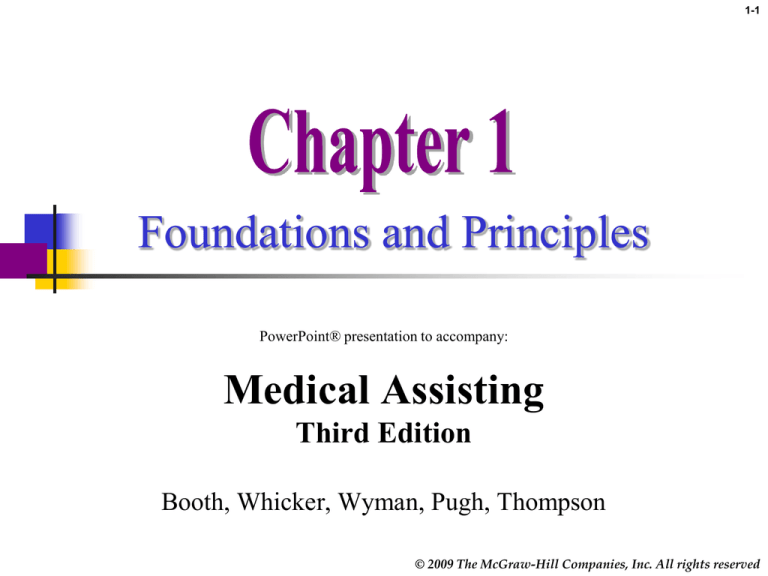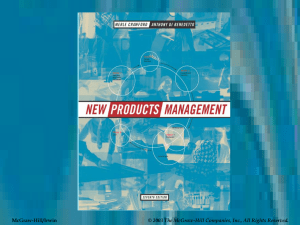
1-1
Foundations and Principles
PowerPoint® presentation to accompany:
Medical Assisting
Third Edition
Booth, Whicker, Wyman, Pugh, Thompson
© 2009 The McGraw-Hill Companies, Inc. All rights reserved
1-2
Learning Outcomes
1.1 Describe the job responsibilities of a medical
assistant.
1.2 Discuss the professional training of a medical
assistant.
1.3 Identify the personal characteristics a medical
assistant needs.
1.4 Define multiskilled health professional.
© 2009 The McGraw-Hill Companies, Inc. All rights reserved
1-3
Learning Outcomes (cont.)
1.5 Explain the importance of continuing education for
a medical assistant.
1.6 Describe the process and benefits of certification
and registration.
1.7 List the benefits of becoming a member of a
professional association.
© 2009 The McGraw-Hill Companies, Inc. All rights reserved
1-4
Introduction
Fast-growing
occupation
Generalist
Medical assistant
Graduate of accredited
institution
Multitasking skills
Someone trained in
all departments of the
facility
A multitasking professional is someone who is able to work in the
administrative area, the clinical areas, and the financial areas.
© 2009 The McGraw-Hill Companies, Inc. All rights reserved
1-5
Growth of the MA Profession
According to U.S. Department of Labor - Bureau of
Statistics, medical assistants held 365,000 jobs in
2002.
60% in physicians’ offices
14 % in hospitals
10% in nursing homes and offices of other health-care
practitioners
Remainder in outpatient care centers, laboratories, and
other health-care-related services
© 2009 The McGraw-Hill Companies, Inc. All rights reserved
1-6
Knowledge Base Needed
Administrative and clinical skills
Patient insurance product knowledge
Compliance (OSHA, CLIA and HIPAA)
© 2009 The McGraw-Hill Companies, Inc. All rights reserved
1-8
Knowledge Base Needed (cont.)
Providing exceptional customer service
Practice management
Current patient treatments and education
© 2009 The McGraw-Hill Companies, Inc. All rights reserved
1-9
American Association of Medical
Assistants (AAMA)
National Organization
Purpose: To raise the standard
of medical assisting to a
more professional level
AMERICAN ASSOCIATION
OF MEDICAL ASSISTANTS
20 N. WACKER DR., Ste. 1575
CHICAGO, IL 60606
(312) 899-1500
http://www.aama-ntl.org/
© 2009 The McGraw-Hill Companies, Inc. All rights reserved
1-10
AAMA
Serves the needs of medical assistants by
providing:
•
•
•
•
•
•
Publications
Accreditation
Certification
Recertification
Continuing education
Legislative monitoring
• Member discounts
• Group insurance
• Annual national
convention
• Networking
opportunities
© 2009 The McGraw-Hill Companies, Inc. All rights reserved
1-11
AAMA Code of Ethics
The Code of Ethics of AAMA sets forth
principles of ethical and moral conduct as
they relate to the medical profession and the
particular practice of Medical Assisting.
Members of AAMA are dedicated to the
conscientious pursuit of their profession.
© 2009 The McGraw-Hill Companies, Inc. All rights reserved
1-12
Apply Your Knowledge
List four ways the AAMA serves the
needs of the medical assistant.
ANSWER: The AAMA serves the needs of the medical
assistant by providing the following services:
Publications
Certification
Continuing Education
Member Discounts
Annual National Convention
Opportunities
Good
Job
Accreditation
Recertification
Legislative Monitoring
Group Insurance
Networking
© 2009 The McGraw-Hill Companies, Inc. All rights reserved
1-13
Importance of Credentialing
Malpractice
Having credentialed personnel or staff will
lessen the likelihood of legal challenges of the
quality of care
Managed Care Organizations (MCO)
Place great importance in credentials for
employees.
© 2009 The McGraw-Hill Companies, Inc. All rights reserved
1-14
Certified Medical Assistant
CMA credential is awarded
by the Certifying Board of
the AAMA
Certification examination
evaluates mastery of
medical assisting
competencies
Recertify every
5 years
Continuing education
© 2009 The McGraw-Hill Companies, Inc. All rights reserved
1-15
Registered Medical Assistant
Credential is given by
American Medical
Technologists (AMT)
Certification exam
Educational and experiential requirements
High school graduate or acceptable equivalent
Graduate from accredited program
Pass the AMT exam
© 2009 The McGraw-Hill Companies, Inc. All rights reserved
1-16
RMA/CMA Examinations
General medical
knowledge
Terminology
Anatomy and
physiology
Behavioral science
Medical law
Ethics
© 2009 The McGraw-Hill Companies, Inc. All rights reserved
1-17
Medical Assistant Associations
Set standards for quality and performance
in the profession
Define tasks and functions for an
occupation
Provide opportunities for member
networking
Further the profession and assist members
to achieve career goals
© 2009 The McGraw-Hill Companies, Inc. All rights reserved
1-18
Member Benefits
AAMA (CMA)
Professional
publications
Educational
opportunities
Group insurance
Legal information
Networking
Legislative monitoring
AMT (RMA)
Professional
publications
AMT Institute for
Education
Educational
opportunities
Group insurance
Legal representation
Networking
Student membership
© 2009 The McGraw-Hill Companies, Inc. All rights reserved
1-19
RMA/CMA Examinations
Administrative
knowledge
Medical record
management
Collections
Insurance processing
HIPAA
Clinical knowledge
Exam room techniques
Medication preparation
and administration
Pharmacology
Specimen collections
© 2009 The McGraw-Hill Companies, Inc. All rights reserved
1-20
Apply Your Knowledge
What are two reasons why credentialing
is important?
ANSWER: The likelihood of a legal challenge to quality of
care decreases when employees are certified, and Managed
Care Organizations place importance on credentials for
employees.
BRAVO!
© 2009 The McGraw-Hill Companies, Inc. All rights reserved
1-21
Apply Your Knowledge
Correct
List three things professional
medical assistant associations do or provide.
ANSWER: Medical Assistant Associations
• set standards for quality and performance for the
profession
• define tasks and functions for an occupation
• provide opportunities for member networking
• assist members to achieve career goals
© 2009 The McGraw-Hill Companies, Inc. All rights reserved
1-22
Accreditation
The process by which programs
are officially authorized
Two recognized entities for
accrediting MA programs
CAAHEP
ABHES
Accreditation ensures that the program meets nationally
accepted standards
© 2009 The McGraw-Hill Companies, Inc. All rights reserved
1-23
Accredited Programs
Greater career options
Completion of a program that
meets national standards
Provides recognition of your education
by professional peers
Makes you eligible for registration
© 2009 The McGraw-Hill Companies, Inc. All rights reserved
1-24
Externships
Obtain practical work
experience
Duties will be planned
to meet your program’s
requirements
Offers you the opportunity to acquire a good
reference
© 2009 The McGraw-Hill Companies, Inc. All rights reserved
1-25
National Healthcare Association
Certification exams for other health-care
occupations, such as phlebotomy and ECG
technician
Continuing education
Program development
Education, career advancement, and networking
services for members
Registry of certified professionals
© 2009 The McGraw-Hill Companies, Inc. All rights reserved
1-26
Volunteering
Experience in a variety of settings
Practical experience
Help you make career
decisions
Include on résumé
© 2009 The McGraw-Hill Companies, Inc. All rights reserved
1-27
Multiskill Training
Reduces health care costs
Personnel are cross-trained for more
than one position
Expands your career opportunities
Office manager
Certified Office Laboratory Technician
Medical lab technician
ECG technician
Medical biller
Hospital admission coordinator
© 2009 The McGraw-Hill Companies, Inc. All rights reserved
1-28
Apply Your Knowledge
What is the purpose of accreditation for
medical assistant programs?
ANSWER: Accreditation ensures that the program
meets nationally accepted standards.
List two advantages of multiskill training.
ANSWER: Multiskill training reduces healthcare
costs and expands your career opportunities.
Great!
© 2009 The McGraw-Hill Companies, Inc. All rights reserved
1-29
Daily Duties of MAs – Entry Level
Administrative, laboratory, and clinical duties
are all part of the duties of a medical assistant
Administrative
Greeting patients
Handling correspondence
Scheduling appointments
Answering telephone
Creating and maintaining patient medical records
© 2009 The McGraw-Hill Companies, Inc. All rights reserved
1-30
Daily Duties of MAs: Entry Level
Laboratory
Performing tests such as
a urine pregnancy test on
the premises
Collecting, preparing,
and transmitting
laboratory specimens
Teaching patients to
collect specimens
Clinical
Assisting the doctor
during examination
Asepsis and infection
control
Giving medications
Performing ECGs
Explaining treatments
to patients
© 2009 The McGraw-Hill Companies, Inc. All rights reserved
1-31
Other Duties
Advanced
Clinical
Laboratory
Initiating an IV and administering medication
Reporting test results
Acting as a patient advocate
Performing as an OSHA compliance officer
Performing more complex testing
Specialization
© 2009 The McGraw-Hill Companies, Inc. All rights reserved
1-32
Personal Qualifications
Critical thinking skills
Attention to detail
Empathy
Willingness to learn
Flexibility
Self-motivation
Professionalism
© 2009 The McGraw-Hill Companies, Inc. All rights reserved
1-33
Appearance
Uniform clean and
pressed
Shoes comfortable,
clean, and white
Hairstyle clean and
pulled back
Nails short, pale color
Avoid acrylic nails
Minimum of jewelry
© 2009 The McGraw-Hill Companies, Inc. All rights reserved
1-34
Attitude
Positive and caring
Respond to criticism as a
learning experience
Take direction from
authority without question
Function as a vital member of a medical team
© 2009 The McGraw-Hill Companies, Inc. All rights reserved
1-35
Change Your Attitude
If you can answer “yes” to any
of these questions
Do I have repeated conflicts with people?
Have I had a conflict at work that has resulted in
termination?
Do I have conflicts with authority figures?
Do people make comments about my attitude?
© 2009 The McGraw-Hill Companies, Inc. All rights reserved
1-36
Integrity and Honesty
Everything you do and every task you complete
should be performed with a goal of excellence.
Integrity and honesty are key in providing superior
customer service to your patients.
Your office staff and physician must be able to trust
you and the decisions you make.
© 2009 The McGraw-Hill Companies, Inc. All rights reserved
1-37
Other Attributes
Diplomacy
Proper judgment
Communication skills
Remaining calm in a
crisis
Ethical behavior
© 2009 The McGraw-Hill Companies, Inc. All rights reserved
1-38
Working As a Team Member
Team dynamics
Assist each other with required duties
Avoid interpersonal conflict with team members
Perform extra responsibilities without
questioning or complaining
Be considerate of other team members’ duties
and responsibilities
© 2009 The McGraw-Hill Companies, Inc. All rights reserved
1-39
AAMA Role Delineation Study
Areas of competence for entrylevel medical assistants
Includes Delineation Chart found
in Appendix 1
Provides the basis for medical
assisting education and evaluation
Three areas
Administrative
Clinical
General
© 2009 The McGraw-Hill Companies, Inc. All rights reserved
1-40
Scope of Practice
Regulated by
Profession’s scope of practice (AAMA)
Your training
State of practice
The policies of the organization or facility
where you practice
© 2009 The McGraw-Hill Companies, Inc. All rights reserved
1-41
Apply Your Knowledge
List any four personal qualifications you should
have to be an effective medical assistant.
ANSWER: List any four of these personal qualifications
that medical assistants should display:
Critical thinking skills Attention to detail
Empathy
Willingness to learn
Flexibility
Self motivation
Professionalism
Good Answer!
© 2009 The McGraw-Hill Companies, Inc. All rights reserved
1-42
Apply Your Knowledge
When should you take action to change
your attitude?
ANSWER: When you can answer “yes” to any of the
following questions:
Do I have repeated conflicts with people?
Have I had a conflict at work that has resulted in
termination?
Do I have conflicts with authority figures?
Do people make comments about my attitude?
Correct!
© 2009 The McGraw-Hill Companies, Inc. All rights reserved
1-43
In Summary
Medical Assistant
Training on-the-job versus training programs
Skills and duties
according to
AAMA Role
Delineation Chart
Stay abreast of changes
in technology,
procedures, and
regulations
© 2009 The McGraw-Hill Companies, Inc. All rights reserved
1-44
End of Chapter
Participating in any aspect of healing
is an awe-inspiring experience.
— Carol Jackson, The Healer’s Art
© 2009 The McGraw-Hill Companies, Inc. All rights reserved






